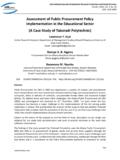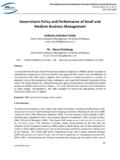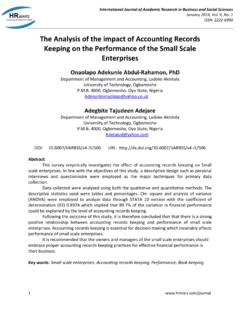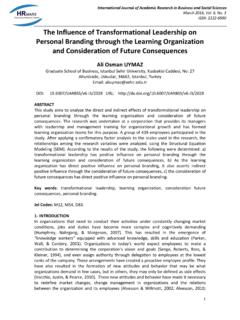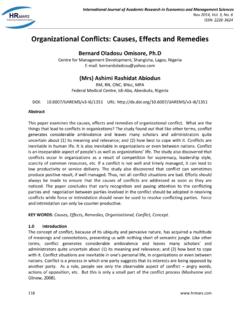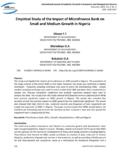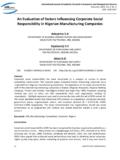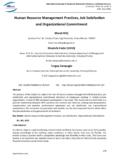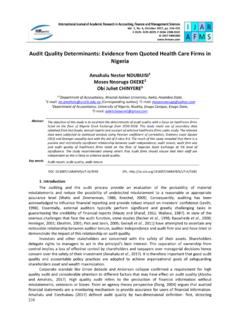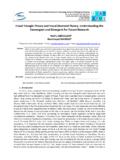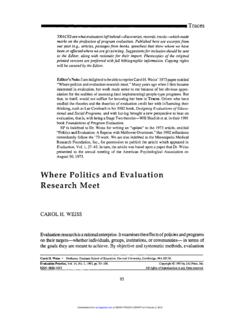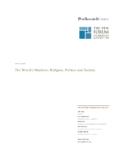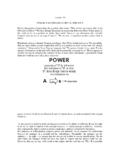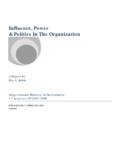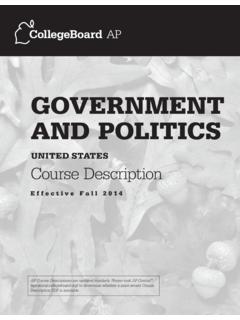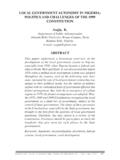Transcription of The Influence of Power and Politics in …
1 International Journal of Academic Research in Business and Social Sciences July 2014, Vol. 4, No. 7 ISSN: 2222-6990 164 The Influence of Power and Politics in Organizations (Part 1) Bernard Oladosu Omisore, Augustina Nwaneka Nweke (Mrs) Members of Teaching Faculty of the Centre for Management Development Shangisha, Lagos, Nigeria DOI: URL: ABSTRACT Organizations are made up of both human and material resources. It is the human resources of an organization that transform or convert the material resources of the organization into finished or consumable products. In trying to transform/convert the material resources of the organization , choices have to be made. Choices as to the type or kind of product to be produced, different materials to be used in order to have the desired product, the type of machinery to be adopted for production efficiency, the financial resources to be involved and its sources, etc.
2 In any of these decisions, choices have to be made. These decisions or choices involve some kind of Politics while the person making the choices or decisions uses some Power to ensure that his/her choices or decisions are accepted. Thus, the Influence of Power and Politics in organizations presents a political analysis of intraorganizational relations in which Power play and Politics is normal. In any organization , we look up to people/human resources for support. This accounts for the inevitability of organizational Politics and Power play. An understanding of organizational Politics requires an analysis of Power , coalitions, and bargaining. The Power relationship is the contest for political action and encompasses the most basic issues underlying organizational Politics .
3 Infact, survival in an organization is a political act. KEYWORDS: Influence , Power , Politics , organizations, human resources INTRODUCTION Organizations are organized bodies of persons or systems. They are neither the rational, harmonious entities celebrated in managerial theory nor the arenas of apocalyptic class conflict projected by Marxists. Rather, it may be argued, a more suitable notion lies somewhere between these two, a concept of organizations as politically negotiated orders (Bacharach and Lawler, 1980). Survival in any organization is a political act. Thus, organizational life is dominated by political interactions. Politics in organizations involve the tactical use of Power to retain or obtain control of real symbolic resources (Bacharach, et al, 1980).
4 Organizational International Journal of Academic Research in Business and Social Sciences July 2014, Vol. 4, No. 7 ISSN: 2222-6990 165 structures are emergent entities. They are the result of the conscious political decisions of particular actors and interest groups. The comparative studies of organizations by sociologists in the last three to four decades have, for the most part, adopted an apolitical view of organizations. This view point may be attributed to a narrow interpretation of Max Weber s (1947) approach to organizations. Sociologists have spent a disproportionate amount of time trying to prove or disprove the plausibility of Weber s ideal construct of bureaucracy. It is safe to say that Weber remains the most cited organizational theorist; however, the narrowness of his impact is best exemplified by the fact that the pages of his work most frequently cited by organizational researchers are those few where he presents his ideal typical model of the organization (Bacharach and Lawler, 1980).
5 While it is true that Weber specified some of the primary dimensions of organizational structure, it is also true that he viewed organizational structure as emerging from the conscious political decisions of interest groups within or outside the organization . For Weber, organizations are not simply rationally determined systems of interdependent structures. They are also systems in which political tension among interest groups can emerge and re-emerge. Bacharach (1978) observes that students working within the structural tradition of Blau and Schoenherr (1964) have been guided by two assumptions that inhibit the development of a political interpretation of intraorganizational dynamics. First, they have tended to cast organizations as normatively integrated systems, thereby ignoring political conflicts and other tensions.
6 Secondly, they tend to view the organization as a holistic entity, and this view overlooks such organizational sub-units as interest groups and coalitions, which are crucial to the development of a political perspective of intra- organizational behaviours. In other words, organizations are not inherently apolitical. Rather, such a characterization may be an artifact of a given theoretical perspective, especially one that emphasizes normative integration and maintenance of the total organization (Bacharach and Lawler, 1980). From the work of Dahrendor (1959), it is clear that three groups appear to be critical to the development of a political analysis of organizations: (a) Work groups: This may be based on departmental differences, differences in departmental work activity, or differences prescribed by the organizational hierarchy.
7 (b) Interest groups: This may be defined as groups of actors who are aware of the commonality of their goals and commonality of their fate beyond simply their interdependence with regard to the conduct of work. (c) Coalition: A coalition may be defined as grouping of interest groups who are committed to achieving a common goal. They are based on the joint action of two or more interest groups against other interest groups. From the above, a political analysis must be concerned mainly with the nature of Power across groupings in the organization and the specification of tactics and countertactics that groups employ (Bacharach and Lawler, 1980). In emphasizing work groups, interest groups, and coalitions as units of analysis, it is believed that individuals become political in groups, and that groups are capable of effecting and often do effect organizational structure.
8 In the same vein, if organizations are to be understood as political systems, we must come to grips with how, when and why groups mobilize Power . Thus, let us now explore the subject of Power more deeply. International Journal of Academic Research in Business and Social Sciences July 2014, Vol. 4, No. 7 ISSN: 2222-6990 166 Power Definitions of Power Like many other words in english language, Power has no single definition. A few definitions of Power are stated below: (i) Power is the ability to employ force and mobilize resources, energy and information on behalf of a preferred goal Gbadamosi (1996) (ii) Power is the probability that a person can carry out his or her own will despite resistance Max Weber (1947) (iii) Power is the ability of persons as groups to impose their will on others despite resistance through deterrence either in the form of withholding regularly supplied rewards or in the form of punishment inasmuch as the former, as well as the latter, constitutes in effect negative sanction Blan (1964) (iv) Power is defined as a force that results in behaviour that would not have occurred if the forces had not been present Mechanic (1962) (v)
9 [ Power is] the ability of one person or group of persons to Influence the behaviour of others, that is, to change the probabilities that others will respond in certain ways to specified stimuli Kaplan (1964) (vi) Power is a capacity that A has to Influence the behaviour of B to do things he or she would not otherwise do (cited in Obisi, 2003). From the different definitions of Power given above, it is quite evident that sanctions are an inherent aspect of a Power relationship. Though the specific ways in which the sanctions are manifested in a relationship vary with the social setting, sanction can be treated in terms of two probability dimensions on a formal level: (a) the probability using sanctions; and (b) the probability of successful sanctions.
10 Not withstanding the specific content, Power can be partially portrayed in terms of these formal probabilities. Subjective Nature of Power Power is the ability a person has to Influence another. The extent of this Power is, however, determined, to a large extent, by the perception of the term Power by the person at whom the Power is directed. It may be more important what a person thinks a superior officer s Power is than what in reality it is. Managers may take advantage of this phenomenon by pretending they have more Power than they actually have, that is, by bluffing. If a manger s bluffing succeeds, the effect is exactly the same as if the one bluffing actually possessed the formal Power . Thus, Power is a delicate phenomenon.
